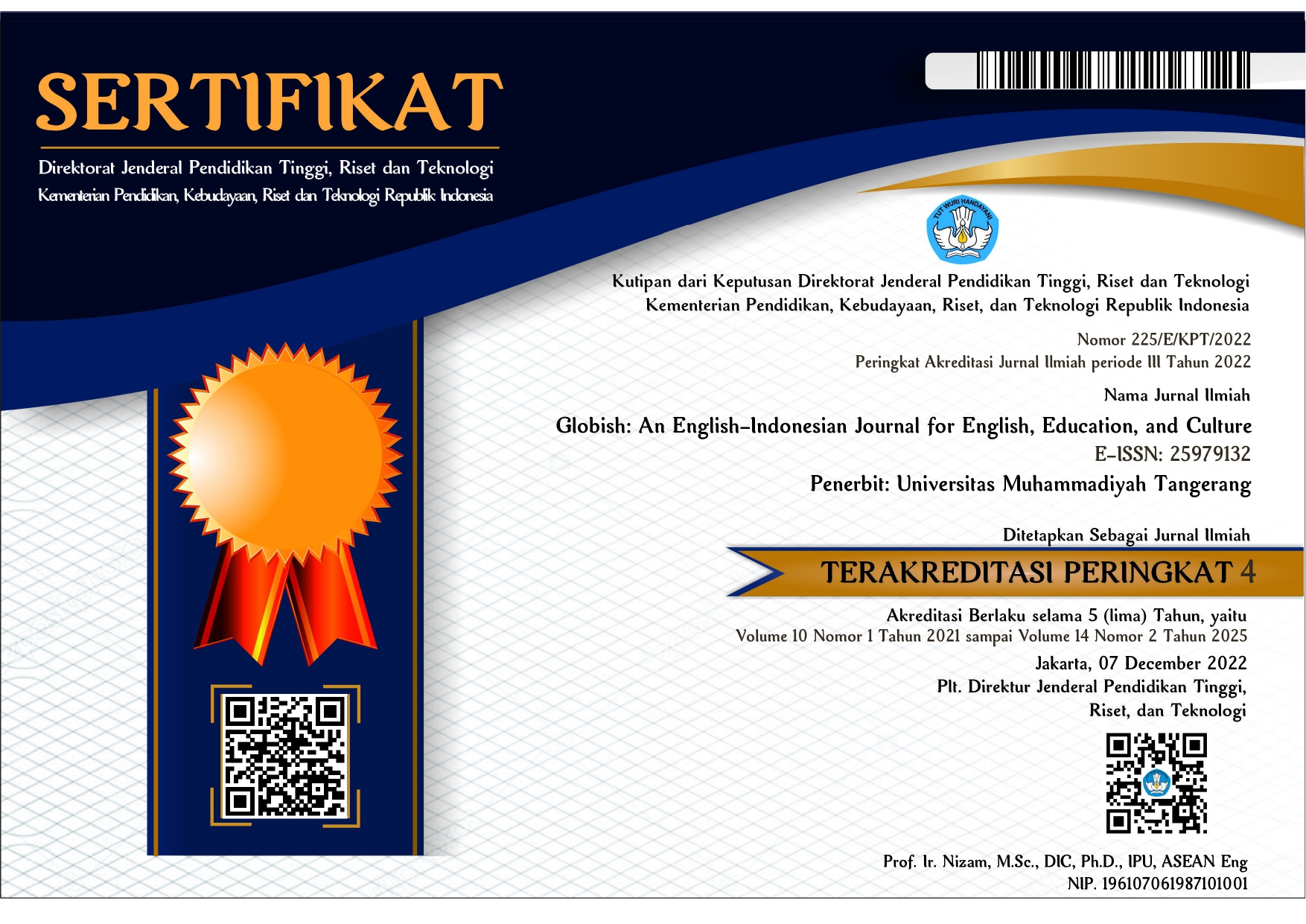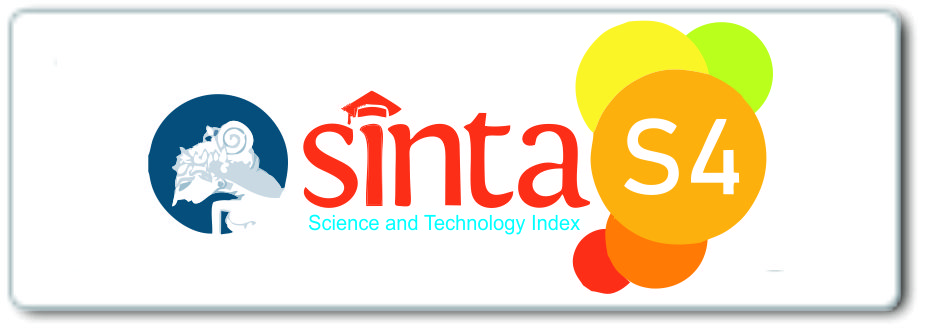THE CORRELATION OF THE TENTH GRADE STUDENT’S VOCABULARY MASTERY AND READING COMPREHENSION AT SMA NEGERI 6 TANGERANG
Abstract
The objective of this study was to determine what causes students 'anxiety about students' English speaking skills. In this study, researchers used qualitative research. For collecting and retrieving research data the researcher using questionnaire, interviews and observations. Researchers involve teachers and students. The researchers take samples in class VII. A where the researcher only took 10 students to be sampled. In this research the researchers conduct classroom observations and provide questionnaire in which students must answer from the 25 questions. The researcher also interviewed one of the English teachers who taught in the class. Here, the researchers used FLCAS to recap the results of the student's questionnaire. In the FLACS questionnaire, the researcher has found the similarities from what the teacher had said in the interview. The students were always anxious in the situations such as; when their names were called by the teacher, when they could not understand what the teacher has said, when they were asked to talk English in the classroom, when they think they will be the laugh stock of their friends as they speak in English. From the FLCAS questionnaire have also supported the findings from the observation. From the questionnaire, some of the students’ respond toward the items showed that they would be the most anxious when they were asked to perform speaking task.
Keywords : Student’s Anxiety, speaking skill, speaking task
Keywords
Full Text:
PDFReferences
REFERENCES
Abrar, M. (2017). An Investigation Into Indonesian EFL University Students' Speaking Anxiety. Journal of English Education and Linguistics Studies, 129.
Agbalizu, M. U. (2006). How Does Anxiety affect Performance in a Foreign Language?
Dubai The British University.
Akkakoson, S., King Mongkut (2016). Reflections from teachers and students on speaking anxiety in an EFL Classroom. Journal of Language and Cultural Education, 2016, 4(3) ISSN 1339-4045 (print), ISSN 1339-4584 (online) SlovakEdu, o.z.
Anandari, C. L. (2015). Indonesian EFL Student's Anxiety in Speech Production and Possible Causes and Remedy. TEFLIN Journal, 1-16.
Ary Donald, J. C. (2010). Introduction to Research in Education (8th ed.). Belmont: WADSWORTH CENGAGE Learning.
Brown, H. D. (2004). Language Assessment: Principles and Classroom Practices. New York:
Pearson Education Inc.
Brown, H. D. (2007). (Fifth ed.). New York:
Pearson Education, Inc.
Cameron, Lynne. (2001) Teaching Languages to Young Learners. New York: Cambridge University Press
Chen, Y. (2015). ESL Students' Language Anxiety in In-Class Oral Presentations. Theses, Dissertations and Capstones. Paper 962. Marshall University: Marshall Digital Scholar.
Ellen, T., & Powell. (1998). Questionnaire Design: Asking Questions with a Purpose. Texas:
University of Wisconsin-Extension.
Express, L. (2010). Public speaking success in twenty minutes a day. New York: LearningExpress, LLC.
Fraenkel R. Jack, Wallen E. Norman, Hyun H Helen. (2012). How to Design and Evaluate Research in Education. New York: McGraw-Hill.
Harmer, J. (2007). The Practice of English Language Teaching. Harlow: Pearson Education
Limited.
Horwitz, E. K. (1986). Foreign Language Classroom Anxiety Scale. The Modern Language Journal, 125-132.
Huang, Q. (2012, July). Study on Correlation of Foreign Language Anxiety and English Reading Anxiety. Theory and Practice in Language Studies, 2(7), 1520-1525.
Imura, T. (2004). The Effect of Anxiety on Oral Communication Skills. Reserach Gate,
P. 174-186.
Kráľová, Z. (2016). Foreign Language Anxiety. Slovakia: Constantine the Philosopher University in Nitra.
Muhlis, A. (2017). Foreign Language Reading Anxiety among Indonesian EFL Senior High School students. English Franca, 19-44.
Richard, J. C. (2008). Teaching Listening and Speaking: From Theory to Practice . New York: Cambridge University Press.
Tanveer, M. (2008). Investigation of the factors that cause language anxiety for ESL/EFL learners in learning speaking skills and the influence it casts on communication in the target language. Unpublished Thesis. Glaslow: University of Glaslow.
Wan Salim et al.(2017) Foreign Language Anxiety (FLA) in English Language Classroom. International Journal of Languages, Literature and Linguistics, Vol. 3, No. 1, March 2017
Wilkinson, D., & Birmingham, P. (2003). Using Research Instrument: A Guide for Researchers. London: Taylor & Francis E-Library.
Woodrow, L. (2008). Anxiety and Speaking English as a Second Language. RELC Journal,
P. 309-328.
DOI: http://dx.doi.org/10.31000/globish.v9i2.2742
Article Metrics
Abstract - 1594 PDF - 867Refbacks
- There are currently no refbacks.
Globish
Program Studi Pendidikan Bahasa Inggris
Fakultas Keguruan dan Ilmu Pendidikan
Universitas Muhammadiyah Tangerang
Jl. Perintis Kemerdekaan I/33, Cikokol
Kota Tangerang, Indonesia
e-mail: globish_journal@umt.ac.id
Globish (p-ISSN: 2301-9913 | e-ISSN: 2301-9913) is licensed under a Creative Commons Attribution-ShareAlike 4.0 International License.









